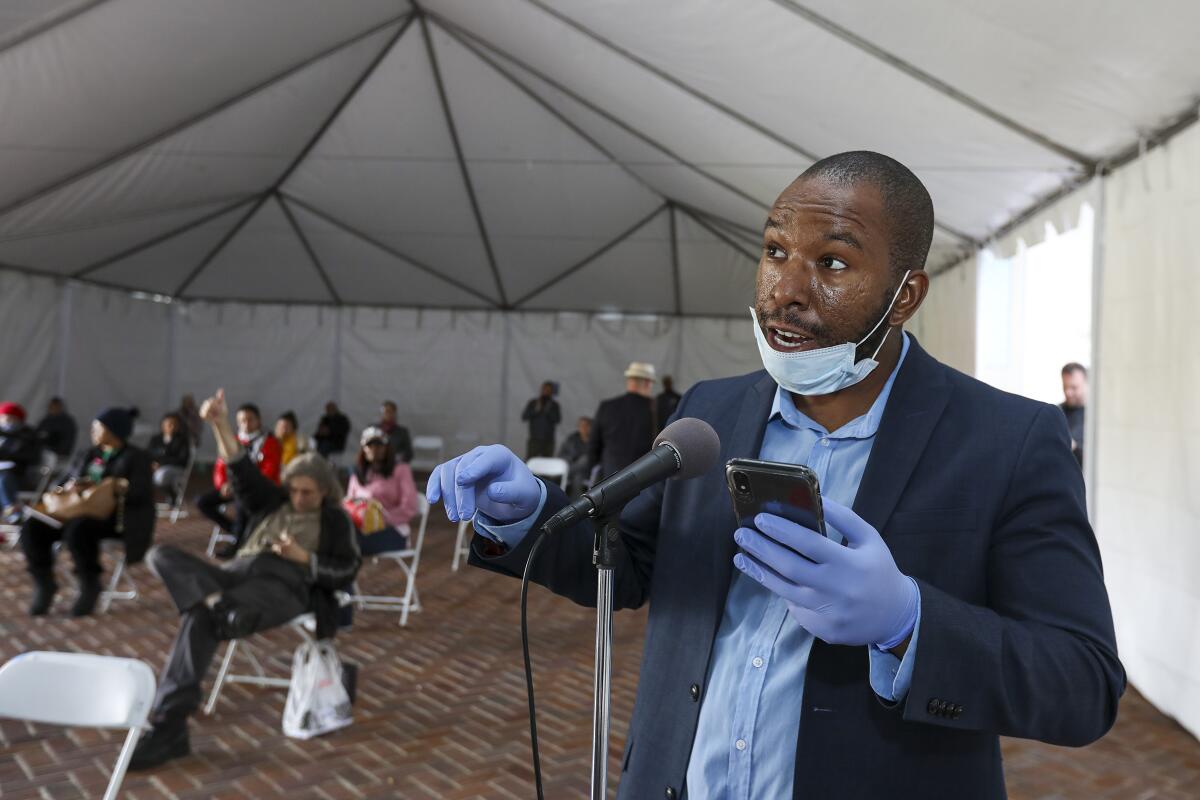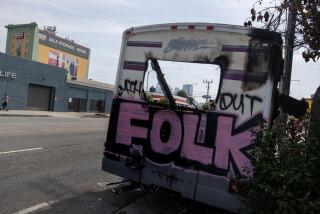Here are L.A.’s plans to protect workers, renters and homeless people amid coronavirus

Faced with the coronavirus crisis, Los Angeles leaders have taken action on key areas involving the homeless population and evictions and are now considering dozens of other measures.
HOMELESS: The Los Angeles City Council voted Tuesday to temporarily stop enforcing a law requiring tents to come down during daytime hours, saying the change is needed to limit the spread of the coronavirus. Council members also voted to instruct city agencies to begin providing hand-washing stations, portable toilets, dumpsters, vermin-proof trash cans and weekly shower service at “major” homeless encampments. But they rejected a plan to stop confiscating the belongings of homeless Angelenos that exceed 60 gallons.
EVICTIONS AND FORECLOSURES: Renters and homeowners are likely to see significant new protections against evictions and foreclosures after City Council approved emergency measures to mitigate the economic effects of the coronavirus. L.A.’s plan will temporarily ban evictions and late fees, require landlords and residential mortgage-holders to work out payment plans with affected residents, reduce city business taxes and create a citywide rental assistance fund. The measures will not take effect immediately. Instead, the council’s vote directs the city attorney to draw up an emergency eviction plan, which could be finalized as soon as Tuesday.
Under consideration:
HYGIENE STATIONS: Offering more hygiene stations with hand sanitizer on the Metro system, proposing 24-hour access to restrooms in public parks, and staffers were asked to scout for city buildings or lots that could be used as testing sites.
FOOD WORKERS: Requiring grocery stores and food delivery services to give their employees time to wash their hands every half hour and ensure that there is free testing for the virus for those employees.
STREET VENDORS: Cracking down on street vendors who don’t have health permits to sell food. Councilwoman Monica Rodriguez had initially floated a temporary moratorium on all street vending, arguing that it would help protect Angelenos from crowds surrounding vendors during the pandemic, but adjusted her proposal during the meeting.
SICK LEAVE: Creating an emergency program that would provide at least 14 days of paid sick leave to Angelenos during a public health crisis or major disaster. Los Angeles already requires sick leave for employees working in the city, ensuring that they can accrue and use up to 48 hours of paid leave — six days — per year. The move is meant to prevent people who have fallen ill from continuing to go to work during the coronavirus pandemic, putting more people at risk of infection.
LOANS: Setting up loans and grants for businesses affected by the pandemic and exploring other business assistance such as easing taxes and fees.
TERMINATIONS: Creating a “just cause termination” law that would ensure that any workers who were laid off for economic reasons are discharged in the order of seniority. They would also have recall rights based on seniority. Employers would be barred from permanently terminating workers — banning them from being recalled — without just cause.
Times staff writers Liam Dillon and Emily Alpert Reyes contributed to this report.
More to Read
Sign up for Essential California
The most important California stories and recommendations in your inbox every morning.
You may occasionally receive promotional content from the Los Angeles Times.



![Los Angeles, CA - May 19: Carlos Vargas, left, and Paulina Rubio, members of the harm reduction team from Homeless Outreach Program Integrated Care Systems [HOPICS], a leading homeless services and housing agency, look for drug addicts to help and pass out supplies at a homeless RV encampment along 77th St. in South Los Angeles Friday, May 19, 2023. The team hands out syringes, fentanyl test strips, overdose reversal nose spray and medication to prevent overdoses, infection and disease transmission, including the HIV virus. Fenanyl is particularly insidious because it can be found in all other drugs, especially meth and heroin. The handouts are also meant to reduce infection through broken pipes, which can cut users mouths and open them to infection. . (Allen J. Schaben / Los Angeles Times)](https://ca-times.brightspotcdn.com/dims4/default/530e2db/2147483647/strip/true/crop/3900x2608+0+34/resize/320x214!/quality/75/?url=https%3A%2F%2Fcalifornia-times-brightspot.s3.amazonaws.com%2Fe9%2F77%2F4b8bd35d4881a3edec6b945b143b%2F1298639-me-soaring-fentanyl-deaths-24-1-ajs.jpg)





